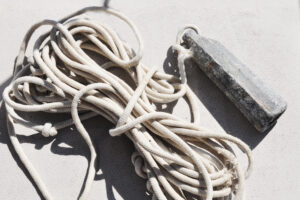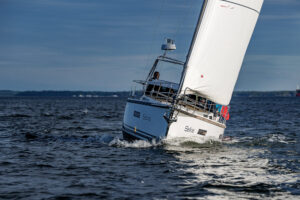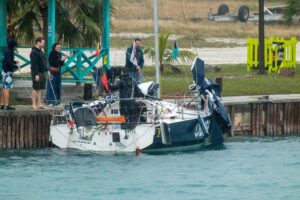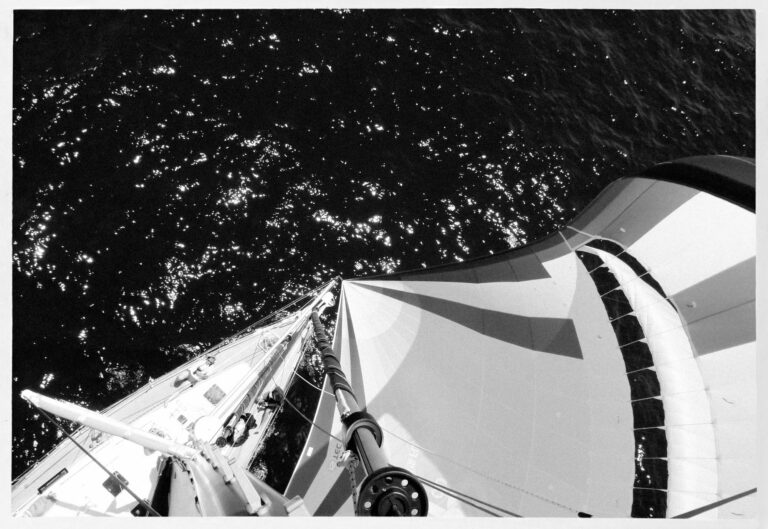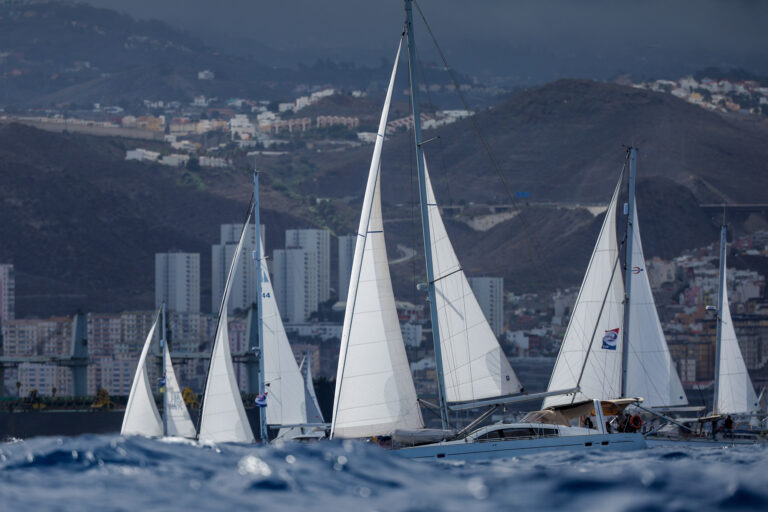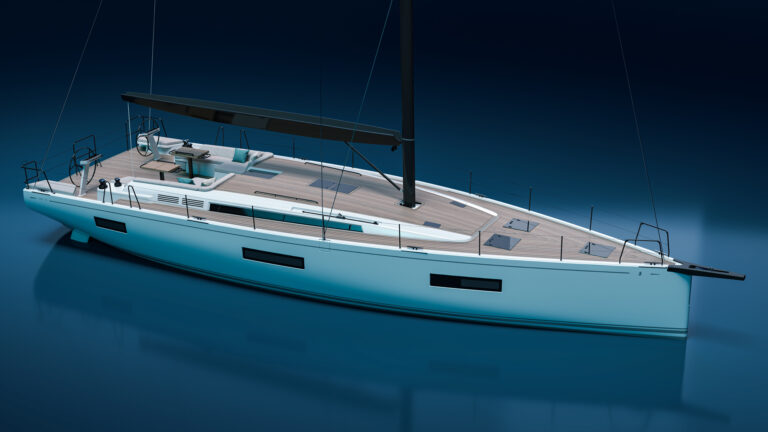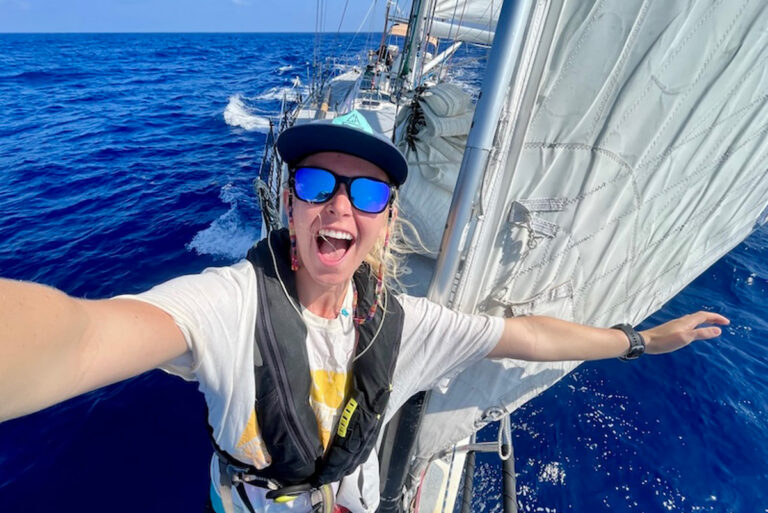
Sea Gypsy
Handing over Wild Card to her new owner felt more like a new-age adoption proceeding than a boat sale. Even I couldn’t believe some of the sappy things coming out of my mouth.
“Will you tell Wild Card,” I found myself saying, “when you leave her for any extended period, that you love her and that you’ll return soon to care for her?”
“I will,” said Robin Krejci sincerely.
“And will you promise to always keep an eye on the bilge?” my wife, Carolyn, added.
“She’s never leaked a drop, but, you know, for 23 years we checked it daily and, well—you never know!”
“Now, now, dear,” I said gently as I consoled her. “Robin will take good care of her. She’s going to a good home.”
It’s odd selling a boat that you’ve sailed twice around the world. But I needed a new suit of sails and a new engine for our 43-foot ketch, Ganesh, and I couldn’t own two boats while sailing one around the world. So selling Wild Card was logical and sensible and utterly right—and very, very painful.
“OK!” I said and threw my hands up in the air. “She’s yours, Captain Robin. May she bring you as much pleasure and good fortune as she has us.”
Yes, it was odd. My image of myself is a reflection of the vessel I sail and love. Sailors are like that—utterly practical on one hand, totally romantic on the other. I’ve always thought that I’ve been blessed throughout my life with my boats and my woman—that each that I touch forever changes me, as I change them. The same is true of my friends. I have thousands of acquaintances, but how many true friends? Not many.
One reason for this is because I treasure oddness and nonconformity almost as much as hard work. In a sense, my friends are my private heroes, my betters.
As we handed over Wild Card, I told Carolyn, “Don’t be too sad. We’re losing a boat, but we’re gaining Robin!”
She smiled. We both looked Robin in the eye. He smiled back.
“Don’t worry,” he said. “I am a tortoise. I learn slowly, but I learn well. My girlfriend and I will adapt one step at a time. We are honored to own Wild Card. We will take good care of your beloved baby.”
Looking in Robin’s eyes is an amazing experience. They are, appropriately, robin-egg blue. They’re also intelligent. And they’re sincere. And they’re fathomless.
“At first, I couldn’t figure Robin out,” his girlfriend, Heather Drost, told us later. “I couldn’t figure out what his angle was. Then I realized that there was none. He’s the most straight-ahead, clear-thinking person I’ve ever met. He’s just remarkable! He says the truth and means it. His word is his bond. We never argue because he never fights back. He’s too wise. And I feel ever so lucky!”
Robin’s story begins 36 years earlier in Czechoslovakia, where his Gypsy mother meets a tall, well-built Swedish man and sparks fly. Her caravan soon leaves, and not that long after, her clan has a stocky, blond-headed boy running wild amid the trailers and vans and wagons.

| |With a new boat comes many new chores, as Carolyn will attest as she stiches up a new mainsail cover.|
He lives freely until, at the age of 12, his Tarot-card dealing mother drops him off with an “aunt.”
Suddenly, the music stops. The aunt wants him to go to school, which he does, but only to be yelled at. Nothing makes sense. His horizon is shrinking. He feels stifled. To compensate, he lifts weights. By 15, he’s buff. He also studies kick-boxing and various other martial arts.
But he needs money as well as muscles, so he borrows some weights and exercise equipment and opens his own gym. By 17, he opens a soon-to-be-popular bar with the gym earnings.
“The bar is still going strong 20 years later,” Robin says with a grin. “With mostly the same cliental!”
Robin now knows what he wants to do: He wants to be a successful business entrepreneur in America. First, though, he has to conquer Europe. With a fistful of cash, he sticks out his thumb and leaves his homeland and tours the European Union, hustling for money at the oddest of jobs. Finally, he washes ashore in New York, only to have his life savings ripped off on the second day in the Big Apple.
“I was young and too trusting,” Robin notes. “And she was very beautiful!”
With no English, no papers, and lots of muscles, the only jobs he can get are dangerous ones.
“On my first morning at work, the second customer we buzz into the pawn shop pulls out a huge gun, sticks it into my face, and starts yelling. I don’t know what he’s yelling, but the gun makes me nervous. I take it away from him, and the robber is suddenly contrite and jovial, claiming he was only attempting to show me how threatening the gun could be. He said he was only trying to sell it.”
The first day was also his last day guarding the doomed pawn shop.
“That same afternoon,” Robin says, “another guy comes in with a gun. A friend of mine is chatting with the owner, and they both see the kid with the gun at the same time. They whip out their pieces and start shooting up the place like a bad movie! I’m chasing the kid, who slips and drops his gun. But he is as fast as a rabbit. I wait until my friend and the owner have to stop and reload, then toss the kid out on the street before they can kill him. End of job.”
In America, Robin has a number of muscle jobs, many of which are confusing. Who are the good guys and the bad guys? Robin doesn’t know. So he decides that when he relieves some fellow of his gun, he doesn’t toss it or keep it, just disassembles it and scatters the parts over a wide area.
“I am learning, how you put it—the American Way?” says Robin.
Robin doesn’t like violence or crime and finds himself work as a bouncer at a popular nightclub. “Nice,” he says. “Mostly no guns.”
One day, a bigwig customer asks Robin if he’d like to make hundreds of dollars for a 20-minute job. Robin says yes. “Bring your swim trucks,” says the guy.
Two nights later, Robin is led to a darkened warehouse on the outskirts of town. He slips in the back door and hears the terrifying roar of a crowd. Damn! He’s never heard the name “Chippendale” before. He tries not to be nervous. “Just another job,” he mutters to himself. But it’s dark as they hustle him out onto the stage, and the sudden spotlight hurts his eyes. He doesn’t realize that the performer before him was covered in oil. Robin slips and erotically falls. The crowd goes wild, and the lust-crazed housewives rush the stage. They stuff money in his Speedo. Hundreds of dollars! As Robin feels the flow of hands fluttering over his hard-muscled body, he thinks, “Yes, America is a truly amazing, truly unbelievable place!”
Two years later, he has a dozen words of English at his command and a net worth of $400,000. He tools around in a brand-new BMW when he’s not managing his popular 35-and-older New York City nightclub.
“Then I make one bad business decision, and I owe $100,000 the following day. I not complain. Fair is fair but hard is hard, too. So I am sad. Oh, well. Begin again! All I have left is beautiful BMW. No good English, so by nightfall I am delivering pizzas from the BMW.”
“In America, if you are willing to work hard, you always succeed!” Robin quips.
Indeed. Robin now is involved with a dozen small-but-growing Midwest businesses, the largest of which employees 80 people. “People are loyal to me because I treat them like I want to be treated. Hard work equals good money, always!”

| |Fatty gets a hand as he hoists the tired old Perkins out of his 43-foot Wauquiez Aphrodite, Ganesh|
Now Robin-the-successful-entrepreneur, once the poor son of a Tarot-dealing gypsy woman, can have anything he wants. But he’s wise enough to know that what he wants aren’t toys but, rather, experiences. So one day he’s reading the magazine you’re holding in your hand and he’s laughing at a sea-gypsy story written by yours truly.
“I realize I want to be gypsy, two times. Once real gypsy. Twice, sea gypsy!”
“Careful!” I say to Robin as Wild Card stands more upright and her jib starts to flutter.
“You’re getting too close to the no-go zone. Fall off and head down, away from the wind a tad.”
Robin is an apt pupil. I’m trying to cram 53 years of offshore experience into the few days we have together sail-training aboard Wild Card.
“Good!” I say. “See the jib telltales streaming aft? That’s perfect. She’s powered up. You’re getting it, Robin. You’re learning the ropes!”
He grins. “The tortoise always wins in the end!”
He should know. He takes part in marathons all over the world, even double marathons. Next year, he plans on competing in a 100-plus-mile footrace. “It is all in the head,” he says, tapping his. “Well, the feet too!”
What does he do to relax between marathons? Ironman contests, of course. “Pretty funny because at first I not know how to swim, and have to learn so I don’t drown, as you can’t win if dead!”
Robin is under no delusion that he’s ready for offshore voyaging. He meticulously plans his “free time” with the same intensity as his business hours. “I will take some sailing courses, and perhaps have a tutor help me aboard Wild Card as well. Once I am comfortable sailing and maintaining her, I will begin spreading my wings. This process is years, not weeks. I know that. But you have to begin somewhere. You have to start. So I start with Wild Card and the King of the Sea Gypsies!”
It doesn’t take Robin long to realize that the strongest member of my team is Carolyn. “Underwater, she hold breath longer,” Robin says. “Above water, very strong for female. In both places, strong in mind, too!”
We train from dawn to dusk, and we cram after dinner, as well. Robin is intrigued with our three sink faucets (fresh, semi, and salt), our solar array, and our wind generator. Plus, he wonders, how much can be packed into tiny Wild Card?
“How did you go four and a half months without reprovisioning or taking on water? It seems impossible in such a small space,” he say after we tell him of our time spent at an Indian Ocean paradise.
“The fish jump into the frying pan in Chagos,” Carolyn explains. “At first, we had fish every other night. Then nightly. Then for lunch and breakfast, too!”
Robin’s eyes sizzle with intensity. You can almost see the wheels turning in his massive head. “I want to be where the fish jump into your arms,” he says.
He says it softly, not as a boast but as a simple declarative statement.
Here is a self-actuated, self-made man, getting the best from modern America. Only a fool would bet against him.
Day after day we sail, we work on Wild Card, and we chat, like old friends. It’s wonderful to see, this lust for the open ocean from a landlubber who’s never experienced her charms.
Story after story, sea yarn after sea yarn, I tell him tales about how wonderful and generous and kind people are all over the world.
“You know the best part?” Robin asks me as we watch the sun hiss into the western mountain astern. “No guns! I will bring no guns! I will sail in peace with my fellow man, and in harmony with nature.”
“Excellent!” I concur. “That’s the Wild Card style!”
Just then, an inflatable detaches itself from an Island Packet at anchor nearby, and a couple putt-putts over.”
“Nice boat,” they say, as they soak up Wild Card’s graceful lines and no-nonsense hardware.
I say nothing and feel odd.
Robin’s pride of ownership is obvious. “Yes, she is, isn’t she?” he says with great happiness.
Cap’n Fatty and Carolyn Goodlander are plotting waypoints and heading westward yet again.


